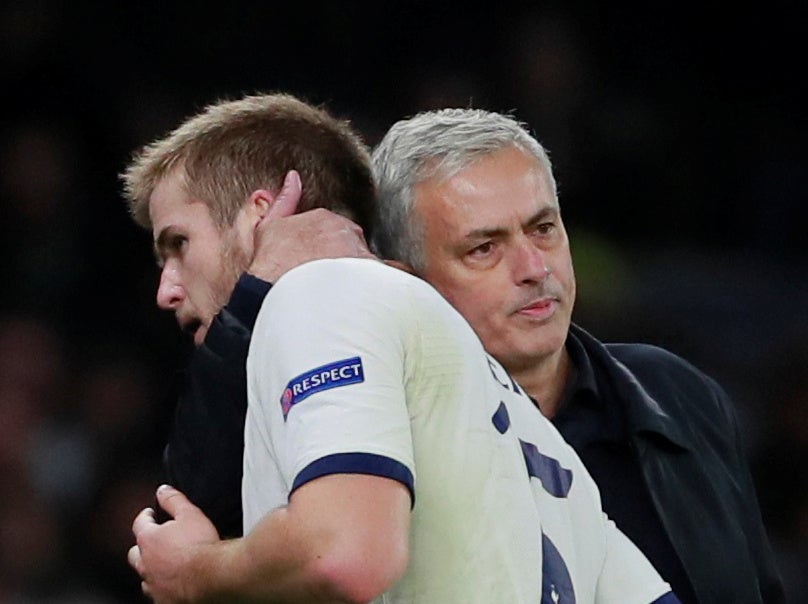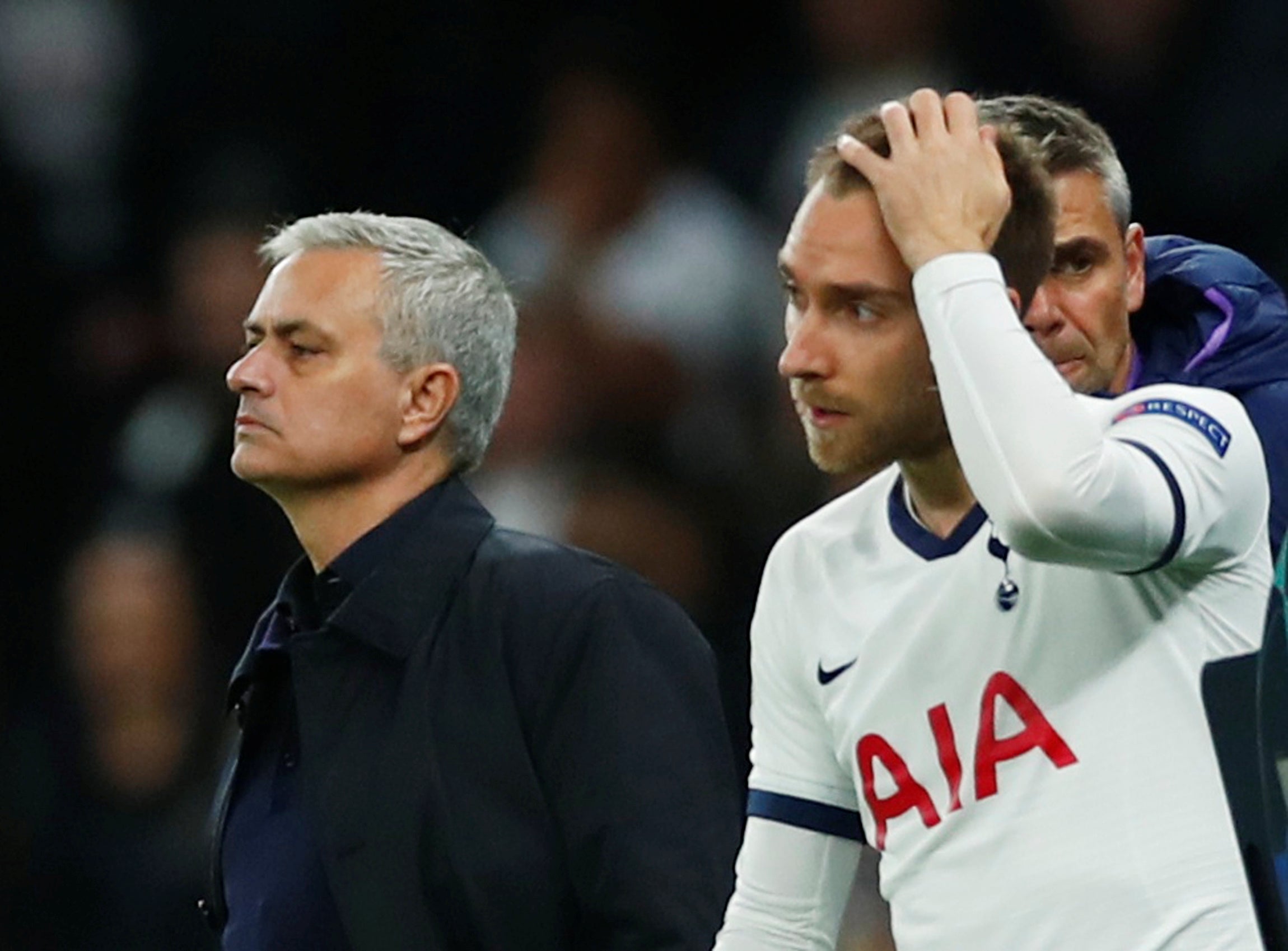How Jose Mourinho’s controlled ruthlessness turned Tottenham’s Champions League fortunes around
At 2-0 down to Olympiacos last night, the horse had bolted. To get back in the match, extra creativity was required. And Mourinho did not shirk the big decision of the match

Your support helps us to tell the story
From reproductive rights to climate change to Big Tech, The Independent is on the ground when the story is developing. Whether it's investigating the financials of Elon Musk's pro-Trump PAC or producing our latest documentary, 'The A Word', which shines a light on the American women fighting for reproductive rights, we know how important it is to parse out the facts from the messaging.
At such a critical moment in US history, we need reporters on the ground. Your donation allows us to keep sending journalists to speak to both sides of the story.
The Independent is trusted by Americans across the entire political spectrum. And unlike many other quality news outlets, we choose not to lock Americans out of our reporting and analysis with paywalls. We believe quality journalism should be available to everyone, paid for by those who can afford it.
Your support makes all the difference.“The most difficult moment of the game for me was not when Olympiakos scored the first or the second goal. The most difficult moment for me was when I made the change.”
“The Change”. The emphasis on it cannot be understated. Even italics does not quite do it justice.
Here was Jose Mourinho, sombre in victory over a substitution that changed the match. A man who is his own biggest cheerleader – he credited himself for “playing” this match and mentioned, unprompted, that it was his 80th win in the Champions League – wanted us to know first of the grave sadness of his masterstroke.
With 29 minutes gone in Mourinho's first outing at the Tottenham Hotspur Stadium, Eric Dier was substituted for Christian Eriksen. Olympiakos were 2-0 up, profiting from Tottenham’s leggy start.
Dier, starting in the same screening position he occupied on Saturday against West Ham, was not injured. Nor was he playing particularly well, but he was certainly not alone. Harry Winks, his partner at the base of Tottenham’s midfield, was at fault for both goals.
The 25-year old was blissfully unaware he was due to be hooked, making his way into the Olympiakos box to offer up his aerial services for the corner due to be taken before the referee signalled a change was to be made.
Even when he turned, it took a moment to register his number was up. Nevertheless, he galloped to the sideline, slightly embarrassed, wary of creating a scene, and accepted a consolatory arm around the shoulder from his manager.
With the match and qualification there to be chased, two holding midfielders protecting the defence was one too many especially when the horses had bolted at 2-0 down. A sprinkling of added creativity was required.
Eriksen’s presence was an extra threat that allowed Spurs to dominate the second half. Beyond his assist – the cross for Harry Kane’s second and the host’s fourth – he caused many problems, such as a free-kick whipped fractionally beyond the far post.
But in all of Mourinho’s post-match interviews, he went out of his way to apologise to the man he dragged off.
“The most difficult moment for me was when I made the change,” he said in his press conference. “I hurt the player and hurt myself. It’s not easy for the player, but not easy for myself. It’s important that the player understands I did it for the team. It was not about his performance, it’s about what the team needs.”
The apology felt contrived. Beyond the dent to Dier’s professional pride, a change was necessary and it made no sense to wait the 16 minutes until the break. Spurs were seeing more of the ball in attacking positions as Olympiakos began retreating and showing the kind of frailties expected of a side bottom of Group B with a solitary point from four matches.
Here was further evidence of Mourinho’s heightened self-awareness. But while it is tempting to chalk up his feelings towards Dier as pure empathy, this public show of remorse seemed more an appreciation of how his weaponising of substitutions have been perceived in the past.
During his first season in English football he made three changes at half-time of an FA Cup tie against Newcastle: Joe Cole, Tiago and Geremi making way for Damien Duff, Frank Lampard and Eidur Gudjohnsen.
A year later, Cole and Shaun Wright-Phillips were removed after just 26 minutes in a loss to Fulham. And last October, he refused to go to the bench during Manchester United’s 1-0 defeat to Juventus. All three examples had deeper meaning.
The first was laying down an early marker that, even in a season of record-breaking success at Chelsea, he would not stand for lacklustre displays in any of the four competitions they were in. The second a more reactionary raging against an appalling start – an effective way of administering an early rollicking from the sidelines that was crystal clear to the other nine players.
Number three was a dig at the powers that be for not providing him with capable alternates and also a nod to the spate of injuries United were dealing with at the time.

One of the questions surrounding Mourinho’s future, even before he took the Spurs job, was whether his methods were outdated. The crux of it centred around how he dealt with players.
The biggest change during the Portuguese’s time in management has been the broadening scale of player power. It has never been easier for a disgruntled footballer to get his message out there or influence a dressing room’s mood. Remember, these are the same Spurs players who saw off one of their best ever managers because they had grown tired of his methods.
Dier has been in and out of the side for the last 18 months but remains a popular member of the squad. Many of his teammates will have sympathised with his plight. Dele Alli, speaking to BT Sport, said: “It could have been any of us to come off, especially myself. I thought I was awful in that first 20 minutes.”
Perhaps Mourinho is acknowledging that to maintain some of his characteristic flourishes, he will need to temper them for the modern sensitivities. Even his half-time team talk at 1-2, he revealed, was “a soft version of himself”, wary of laying waste to what brittle self-esteem there remains in the dressing room.
“I had to do it for the team and again I apologise for Eric,” he said. “In spite of [the substitution], he knows that I did it for the team and not with the intention to hurt him.”
Whatever emotional reaction Dier or his teammates had on Tuesday night will have dissipated when they awoke on Wednesday in the latter stages of the Champions League. Even in offering Dier support, Alli recognised the substitution worked, and there was a sense it was one Mauricio Pochettino would not have made.
For all Mourinho’s contrition, he was brought in as someone not afraid to make tough decisions. The Change was simply the first of many.
Join our commenting forum
Join thought-provoking conversations, follow other Independent readers and see their replies
Comments